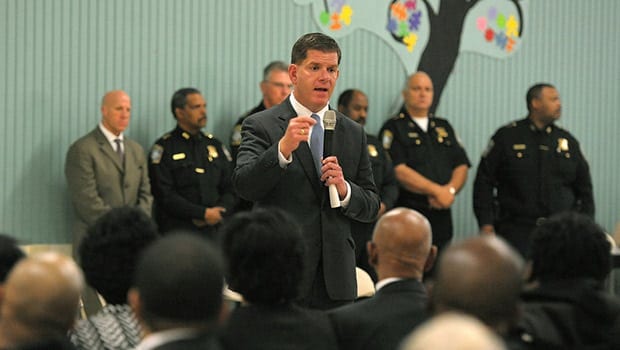
As Martin Walsh enters his sixth month as mayor, political observers in Boston’s black, Latino and Asian communities are cautiously optimistic about his administration’s work in the neighborhoods of Boston.
But while Walsh campaigned on promises to bring more diversity to city government, activists continue to voice concern about his administration’s commitment to opening the doors of City Hall to blacks, Latinos and Asians.
“There’s still a lot of work to be done,” said the Rev. Miniard Culpepper, pastor of Pleasant Hill Baptist Church. “You have to make a concerted effort to diversify a cabinet.”
As he enters the sixth month of his administration, Walsh’s cabinet includes eight whites and three people of color. He presides over a city government with entrenched economic inequality, with blacks, Latinos and Asians concentrated in lower-paying jobs than those held by whites.
And, according to statistics provided by the Walsh administration, that pattern is continuing with Walsh’s new hires. Of the 256 people hired by the administration, the 112 whites are in the minority. But with an average yearly salary of $46,341, the white hires are making more than twice the average $20,929 salary of the 27 Latino hires and far ahead of the average $25,415 the 111 black hires are earning.
One factor contributing to the lower average salaries of African American employees is the fact that 39.6 percent are youth workers earning $16,000 or less. Of the 27 Latino hires, 13 are youth workers.
Walsh could not be reached for comment for this story by the Banner’s press deadline.
Culpepper said the mayor could better integrate City Hall by putting more people of color in leadership positions, pointing to former mayor Raymond Flynn choice of Clarence “Jeep” Jones as deputy mayor.
“Flynn allowed Jeep to do a lot of recruiting and bringing people in,” he said. “You have to have someone at that level.”
While many interviewed by the Banner expressed concern over the Walsh administration’s hiring, there was agreement that the mayor is open to suggestions and input.
“People are still hopeful and waiting to see what he does,” said political activist Kim Janey. “There are certainly more positions that need to be filled.”
Sociedad Latina Executive Director Alexandra Oliver-Davila, who met with Walsh as a member of the Latino Network and voiced concern over the mayor’s commitment to diversity, expressed cautious optimism.
“I believe he heard us,” she said. “I hope there will be positive movement going forward.”
One area where Walsh earned high marks early on was his shakeup of the Boston Police Department’s command staff, where 12 of the 24 positions are now held by people of color and women. In a department that has long been dominated by white men, the shakeup was unprecedented.
Walsh’s personnel decisions aside, blacks, Latinos and Asians contacted by the Banner expressed support for the mayor’s initiatives.
Chinese Progressive Association Executive Director Lydia Lowe gave Walsh high marks for what she described as the administration’s efforts to stabilize working-class communities.
“I think he’s sincere and concrete steps are being taken,” she said, noting that the mayor and Department of Neighborhood Development Director Sheila Dillon have attended Chinatown Master Plan meetings.
“The last time that happened was under Ray Flynn and [former Boston Redevelopment Authority Director] Stephen Coyle.”
While Chinatown has seen a profusion of luxury apartment buildings that have displaced long-term residents and driven up costs, in the last two weeks, two affordable housing developments broke ground in the neighborhood.
“For the first time, we have city leaders, even the mayor himself, saying we have enough luxury units now,” Lowe said.
Lowe also expressed support for the mayor’s decision to hire an outside auditing firm to review the BRA and bring more transparency to city government.
“I feel cautiously optimistic about where we’re going,” she said. “I think it’s important for community groups to continue to organize, though. There are lots of powerful groups on the other side of these issues.”
In Roxbury, Walsh has received praise for his early commitment to bring a business incubator to the neighborhood’s commercial heart in Dudley Square. BRA Director of Planning Kairos Shen said the agency will issue a request for qualifications for an operator for a 4,500 square-foot incubator in the Ferdinand Building.
Walsh has also increased funding to the Boston Main Streets program by more than 30 percent. The Main Streets program provides resources to businesses in 20 of the city’s neighborhood commercial districts.
With regard to the city’s school system, some in the black community have questioned the administration’s move to cut busing for most 7th and 8th graders, a move that would save $8 million. Most of the affected students would be given MBTA passes. At a series of community meetings, opponents of the cuts said the move would put 12- and 13-year-old students in harm’s way.
“To put middle school students on these buses, you’re putting them in harm’s way,” Culpepper said. “To us, it’s the safety of our children that matters. And you can’t put a dollar amount on your children’s heads.”
Still, like others in the black, Latino and Asian communities, Culpepper praised Walsh for meeting with him and other black religious and civil rights activists to discuss busing and other issues.
“We’re working closely with him,” Culpepper said. “We want to see him succeed, and we want to help him succeed.”







